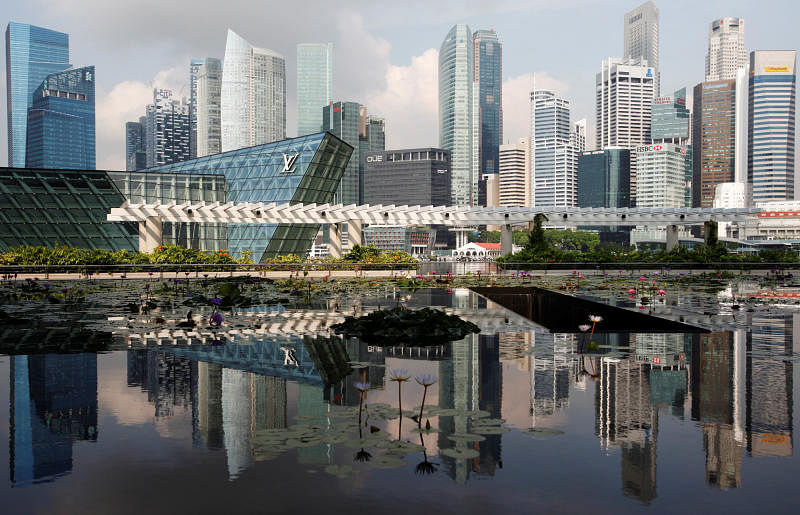Singapore's 23 key industries to be grouped into 6 clusters as economy begins next phase of transformation: Heng Swee Keat
Sign up now: Get ST's newsletters delivered to your inbox

The aim is to position Singapore as a key node for technology, innovation and enterprise in Asia and around the world.
PHOTO: REUTERS
Chia Yan Min
Follow topic:
SINGAPORE - The next phase of Singapore's economic transformation will involve deepening linkages between complementary industries by grouping them into clusters, said Finance Minister Heng Swee Keat.
The aim is to position Singapore as a key node for technology, innovation and enterprise in Asia and around the world.
Now that all sector-specific road maps for key industries have been rolled out, the Government will group these 23 sectors into six clusters to maximise opportunities for collaboration, Mr Heng said at a media briefing on Wednesday (April 18).
The six clusters - each helmed by a minister and at least one private sector or union representative - will be unveiling plans in the coming months to promote innovation, deepen capabilities and encourage partnerships in the sectors under their purview.
The clusters are:
- Manufacturing (co-chaired by Senior Minister of State for Trade and Industry and National Development Koh Poh Koon; Amos Leong, president and chief executive of precision engineering firm Univac; and Ang Kay Chai, senior vice-president and general manager of GlobalFoundries Singapore)
- Built environment (co-chaired by Second Minister for National Development Desmond Lee and Lim Ming Yan, president and group chief executive officer of CapitaLand)
- Trade and connectivity (co-chaired by Senior Minister of State for Trade and Industry and National Development Koh Poh Koon and Wolfgang Baier, chief executive of regional beauty product distributor Luxasia Group)
- Essential domestic services (co-chaired by Senior Minister of State for Communications and Information and Health Chee Hong Tat and National Trades Union Congress president Mary Liew)
- Modern Services (co-chaired by Senior Minister of State for Finance and Law Indranee Rajah and Teo Lay Lim, Accenture's senior managing director, Asean and country managing director)
- Lifestyle (co-chaired by Senior Minister of State for Trade and Industry Sim Ann and Vincent Tan, managing director of Select Group and president of the Restaurant Association of Singapore)
This latest move to group industries by cluster comes after the final Industry Transformation Map (ITM) was unveiled in March for the early childhood education sector.
ITMs were first launched as part of a S$4.5 billion industry transformation package in Budget 2016. They are industry-specific road maps which aim to take an integrated approach where trade associations and chambers (TACs), companies, and the Government work together to help each sector prepare for the future.
A total of 23 road maps covering 80 per cent of the Singapore economy have been launched.
The next phase of Singapore's economic transformation will cement the Republic's position as a "global Asia node" of technology, innovation and enterprise, said Mr Heng.
This means making innovation pervasive, building deep capabilities in companies and among workers, as well as developing strong partnerships both within Singapore and around the world.
Taking an integrated approach to transformation will help bring diverse capabilities together, Mr Heng said. For example, in the lifestyle cluster, there is scope to explore how firms in hotel services and food services can work together to bring major events and conferences to Singapore, as well as improve experiences for tourists.
Citing hawker centres as an example, he added: "In a hawker centre, stalls sell different food and are competing but at the same time they are cooperating - people know that hawker centres will always have a great variety of good food.
"This is what I hope Singapore companies can also do. Everyone is good at something, and together we can build a reputation as the best 'hawker centre' in town."

